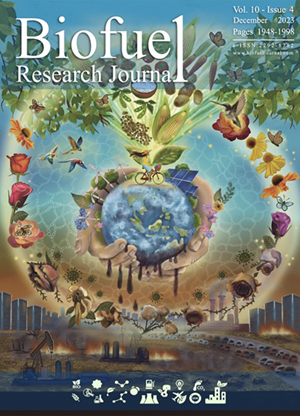关于量化生物燃料碳足迹的不确定性来源:作物/原料、生命周期评价建模方法、土地利用变化和温室气体指标
IF 11.9
Q1 ENERGY & FUELS
引用次数: 38
摘要
生物燃料系统可能是一种很有前途的战略,通过在发电和运输中取代化石燃料来应对气候变化。由于生物燃料对气候变化影响的估计存在不确定性,例如对土地利用的间接影响,用糖和淀粉作物生产乙醇(一种汽油替代品),用油籽作物生产生物柴油(一种石油柴油替代品)的第一代生物燃料受到越来越多的审查。该分析估计了一些不确定性来源的大小:i)作物/原料,ii)生命周期评估(LCA)建模方法,iii)土地利用变化(LUC),以及iv)温室气体(GHG)指标。用于表征不同温室气体的指标(不同时间段的全球变暖潜能值和全球温度变化潜能值)似乎在解释生物燃料碳足迹的差异方面没有发挥重要作用,而不是所使用的作物/原料、纳入/排除土地利用变化的考虑因素,以及生命周期评价建模方法(p<0.001)。生物燃料的估计气候足迹取决于后三个参数,因此是特定于具体情况的。建议以符合研究目标和范围的方式处理这些参数。特别是,根据每种不确定性来源的选择来解释生物燃料系统的碳足迹结果至关重要,建议进行敏感性分析,以克服其对结果的影响。本文章由计算机程序翻译,如有差异,请以英文原文为准。
On quantifying sources of uncertainty in the carbon footprint of biofuels: crop/feedstock, LCA modelling approach, land-use change, and GHG metrics
Biofuel systems may represent a promising strategy to combat climate change by replacing fossil fuels in electricity generation and transportation. First-generation biofuels from sugar and starch crops for ethanol (a gasoline substitute) and from oilseed crops for biodiesel (a petroleum diesel substitute) have come under increasing levels of scrutiny due to the uncertainty associated with the estimation of climate change impacts of biofuels, such as due to indirect effects on land use. This analysis estimates the magnitude of some uncertainty sources: i) crop/feedstock, ii) life cycle assessment (LCA) modelling approach, iii) land-use change (LUC), and iv) greenhouse gas (GHG) metrics. The metrics used for characterising the different GHGs (global warming potential-GWP and global temperature change potential-GTP at different time horizons) appeared not to play a significant role in explaining the variance in the carbon footprint of biofuels, as opposed to the crop/feedstock used, the inclusion/exclusion of LUC considerations, and the LCA modelling approach (p<0.001). The estimated climate footprint of biofuels is dependent on the latter three parameters and, thus, is context-specific. It is recommended that these parameters be dealt with in a manner consistent with the goal and scope of the study. In particular, it is essential to interpret the results of the carbon footprint of biofuel systems in light of the choices made in each of these sources of uncertainty, and sensitivity analysis is recommended to overcome their influence on the result.
求助全文
通过发布文献求助,成功后即可免费获取论文全文。
去求助
来源期刊

Biofuel Research Journal-BRJ
ENERGY & FUELS-
CiteScore
22.10
自引率
1.50%
发文量
15
审稿时长
8 weeks
期刊介绍:
Biofuel Research Journal (BRJ) is a leading, peer-reviewed academic journal that focuses on high-quality research in the field of biofuels, bioproducts, and biomass-derived materials and technologies. The journal's primary goal is to contribute to the advancement of knowledge and understanding in the areas of sustainable energy solutions, environmental protection, and the circular economy. BRJ accepts various types of articles, including original research papers, review papers, case studies, short communications, and hypotheses. The specific areas covered by the journal include Biofuels and Bioproducts, Biomass Valorization, Biomass-Derived Materials for Energy and Storage Systems, Techno-Economic and Environmental Assessments, Climate Change and Sustainability, and Biofuels and Bioproducts in Circular Economy, among others. BRJ actively encourages interdisciplinary collaborations among researchers, engineers, scientists, policymakers, and industry experts to facilitate the adoption of sustainable energy solutions and promote a greener future. The journal maintains rigorous standards of peer review and editorial integrity to ensure that only impactful and high-quality research is published. Currently, BRJ is indexed by several prominent databases such as Web of Science, CAS Databases, Directory of Open Access Journals, Scimago Journal Rank, Scopus, Google Scholar, Elektronische Zeitschriftenbibliothek EZB, et al.
 求助内容:
求助内容: 应助结果提醒方式:
应助结果提醒方式:


